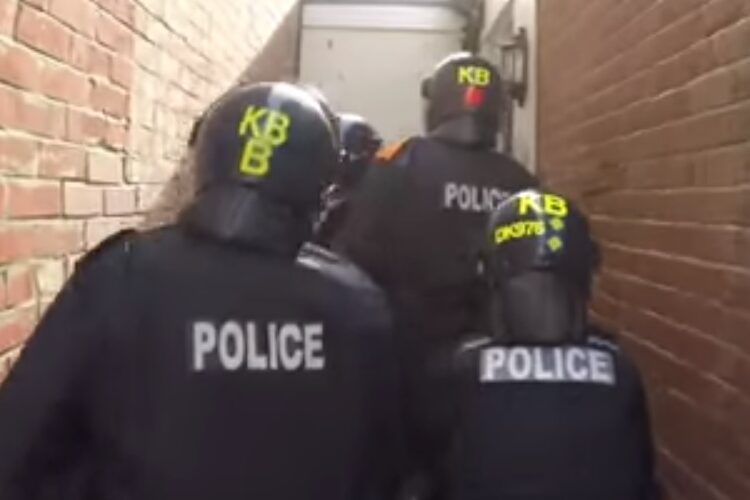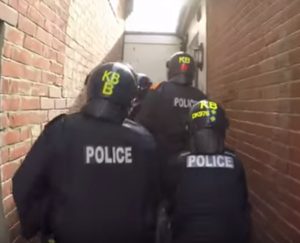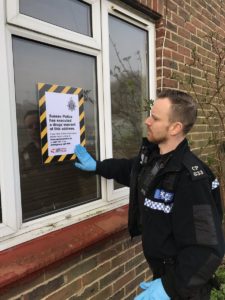Drug-dealing “cuckoos” have been barred from more than 20 properties in Brighton and Hove, according to a report published today (Friday 12 January).
The premises have been closed and dealers arrested as part of a crackdown by Sussex Police and Brighton and Hove City Council.
The report said: “County lines is the police term used to describe urban gangs supplying drugs to market and coastal towns across the country using dedicated mobile phone lines.
“Gangs often use children and vulnerable people to move drugs and money between different locations.
“Gangs establish a base, typically by taking over the homes of local vulnerable adults, who are often drugs users, by force or coercion in a practice referred to as cuckooing.”
The report said that policing “county lines” involved dealing with offences and issues related to “drugs, violence, gangs, safeguarding, criminal child exploitation, modern slavery and missing persons”.
The report also said: “Drugs supplied through county lines are primarily heroin and crack cocaine, cannabis is also supplied by runners as a secondary drug as an independent side-line to generate extra income.
“County lines gangs have a proven ability to adapt their operations quickly to evade detection and enforcement. High levels of violence are reported, including the prevalent use of weapons to intimidate and control members and associated victims.
“The national response involves the police, the National Crime Agency, a wide range of government departments, local government and the voluntary and community sector.
“County lines activity and the associated violence, drug dealing and exploitation has a major impact on young people, vulnerable adults and local communities.
“Locally we have seen an increasing number of properties that have been cuckooed – where the property of a vulnerable person is taken over by drug dealers.
“In several cases offenders and victims were traced to another address nearby or elsewhere in the city.
“There is no doubt that county lines are operating in the city. The police and the council have closed down over 20 premises in the past two years using Closure Orders under the 2014 Anti-Social Behaviour Policing and Crime Act.
“There have been incidents of violence associated with these addresses with knives and other weapons reportedly being used.
“The true scale of county lines activity is difficult to determine nationally or locally with accuracy as its nature is fluid and the intelligence surrounding the threat is not always clear.
“Sussex Police regularly disrupt drug dealing in the city in a comprehensive operation using specially trained officers from out of force to identify dealers.
“These operations take time to set up and deploy. The last such operation in the city led to 76 arrests for drug supply offences with 10 offenders still outstanding.
“Fourteen county lines were disrupted as part of this operation.
“Police estimate that one county line uncovered in Sussex was supplying cocaine worth £2 million per annum.
“These police operations need to continue as they are having an impact on drugs supply.
“However, demand in the city means that new drug dealers quickly take the place of those that have been arrested.
“In the city there are robust working practices for dealing with premises that have been cuckooed.
“This includes gathering intelligence, executing drugs warrants, closing premises quickly using Anti-Social Behaviour Policing and Crime Act powers when necessary to bring relief to neighbours, supporting vulnerable and displaced residents and taking direct action against perpetrators of crime.
“This work is guided by established Cuckooing and Premises Closure Guidance for officers.
“Officers met with colleagues from Thanet in Kent on (Monday) 13 November to understand how they identified and took action to address county lines.
“Learning from this will inform activity locally.
“The leadership group at the council, comprised of leaders from all parties and executive officers from the council, called for a learning review to be produced in response to a number of addresses being cuckooed in one street in Brighton in 2017.
“This has been disseminated to officers to help them identify early signs of cuckooing and county lines, what action can be taken and how to support communities.”
This learning review is due to be presented to the Leadership Board on Monday 15 January.
Housing, community safety and other officials from the council are expected to work with community groups to help more people “understand the pernicious nature of county lines”.
They also aim to help them understand how county lines can affect “vulnerable people resulting in cuckooing and anti-social behaviour and crime in neighbourhoods”.
The report, to the council’s Neighbourhoods, Inclusion, Communities and Equalities Committee, said: “Officers are developing an action plan with clear measurable activity that will impact on county lines.
“The progress on this work will be reported to this committee in six months.
“There is significant drugs demand in the city.
“At an initial meeting on (Wednesday) 20 December key stakeholders including public health colleagues and police met to scope how drugs demand in the city could be assessed.
“Drugs demand will be mapped establishing where the hotspots are but more significantly who the users of drugs are and what drugs they are using.
“There is a good understanding of the demographic of chaotic users but many users can afford drugs and drugs misuse has little immediate impact on their lives.

“Officers have met with the Metropolitan Police and the Home Office who are keen to help establish the profile and extent of drugs use in the city.
“County lines operate in the city because there is substantial demand for drugs.
“This work will be linked to the county lines action plan being established by the Community Safety Partnership.”
Councillor Emma Daniel, who chairs the neighbourhoods committee, said: “County lines is a particularly nasty crime as it preys on the young and vulnerable.
“The gangs operate here due to the high demand for drugs and we’ve seen the significant impact it and the associated anti-social behaviour has on neighbourhoods.
“We’re asking parents to be alert to the dangers. We’re clear that any children and young people who get drawn into this are victims of crime.
“If you have any concerns about a young or vulnerable person in your neighbourhood, please do report them to make sure they can get the help they need.
“Please also report any suspicions you have about a property. Effective action to tackle the problems relies on early reporting and solid evidence and we will work across services to tackle the problem as soon as we can.”
Chief Inspector Chris Veale, of Sussex Police, said: “We have robust working practices in the city for dealing with cuckooed homes, including gathering intelligence, executing drugs warrants, closing premises quickly using Anti-Social Behaviour Policing and Crime Act powers, supporting vulnerable and displaced residents and taking direct action against perpetrators of crime.”
Anyone who suspects drug dealing or who has information is asked to contact Sussex Police online at www.sussex.police.uk or by calling 101, quoting Project Preclude.
For information about reporting anti-social behaviour in the city, visit www.brighton-hove.gov.uk/asb or call the community safety team on 01273 292375.
The full report is available in the Neighbourhoods, Inclusion, Communities and Equalities Committee agenda papers.











